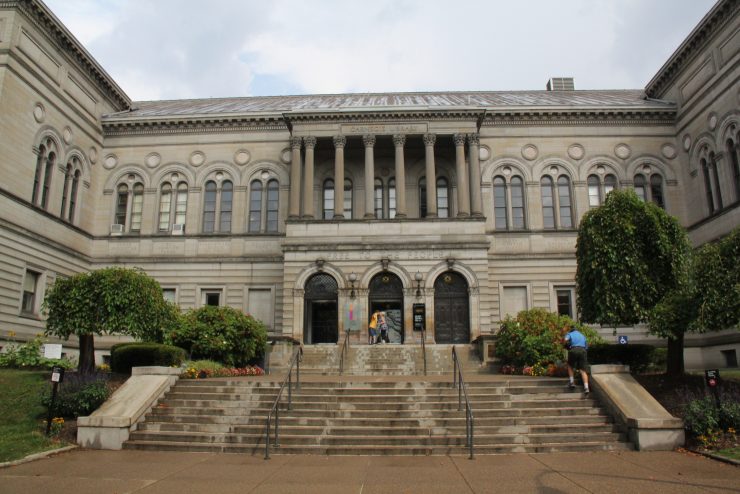
More often than not, when I say I’m from Pittsburgh I get several responses that are all variations on this theme: Pittsburgh, huh? So that’s like, the (insert Steelers, Penguins, or Pirates) and dirty steel mills, right? And despite the fact that I’m not actually from Pittsburgh (rather, the rural middle-of-nowhere area around the city), I feel a deep loyalty to the Steel City from living there in my early and mid 20s. It’s my city-home; the first urban place I ever got to really explore and make my own. It’s also where I started truly appreciating and working in coffee. Thus, I feel an onus to tell everyone how really great Pittsburgh is.
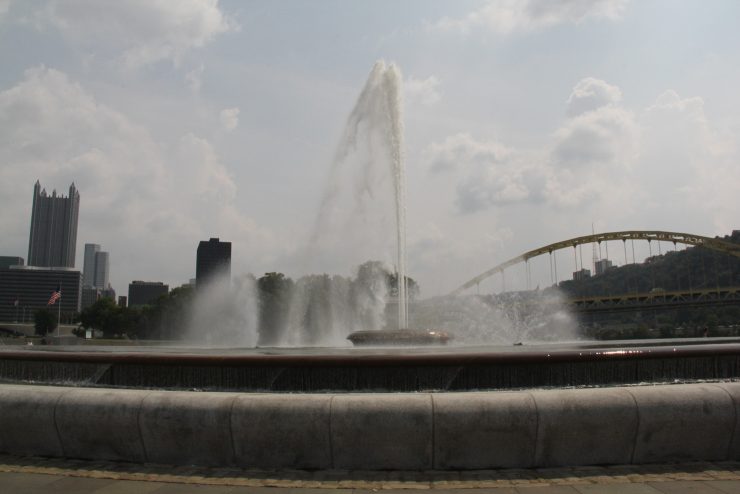
There are, however, a few things you should know about Pittsburgh before I start taking you on a tour of its coffee shops. These things don’t just influence the city but also its coffee scene (these shops in particular) and are a huge part of what makes it so unique. First, most of the super cool stuff that happens in Pittsburgh happens kind of under the radar, often publicized only through fliers, word of mouth, community message boards, and possibly Facebook. Second, while there is now only one working steel mill in the vicinity of the city, Pittsburgh’s working class roots prevail in shaping the culture—despite healthcare, technology, and education being the leading industries now. There’s a certain pull-yourself-up-by-the-bootstraps mentality that believes in hard work and the rewards to be had by it. Third, and lastly, Pittsburgh has never sought outside confirmation of its merits. We’re just doing our thing. We’re a tough, salty, pierogi-loving, true-blue folk, we Yinzers, and once we love you, there isn’t anything we wouldn’t do for you (case in point: The Pirates). Which is possibly why these coffee shops—starting from their humble beginnings (no venture capital backing, here)—have not only endured, but thrived.
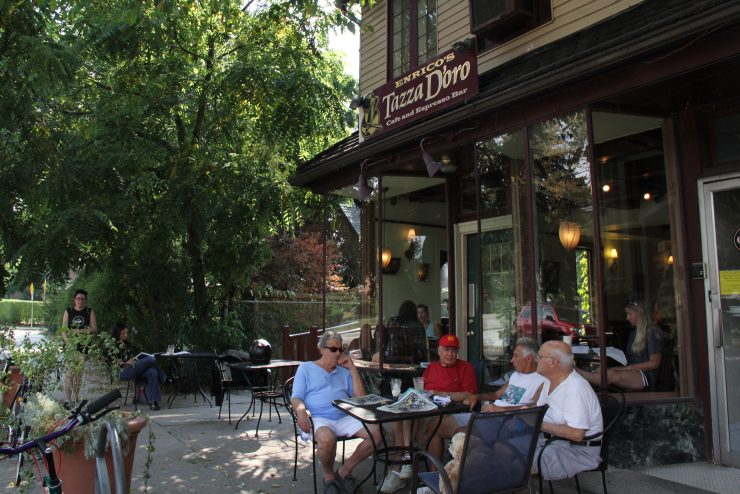
Tazza D’Oro
First up: The OG of specialty coffee in Pittsburgh (and a former employer of mine)—Tazza D’Oro. Don’t let the name, its vine-covered exterior, and homey feel fool you into thinking this cafe is serving up coffee in a fusty style. The traditional feel is as intentional as the coffee service. When Amy Enrico started her business in 1999, she wanted to create a vibrant neighborhood spot she felt was missing in Pittsburgh. “To me, that’s what coffee shops do. They’re a huge community hub,” she told me. But creating a “third place” wasn’t her only goal. “I wanted to take it to the next level. I wanted to find the best coffee I could get in the country and I wanted to do the training thing from the very beginning.” With help from her roaster, Enrico developed a training program to certify her baristas four years before the Barista Guild of America was even founded. Moving from Batdorf & Bronson Coffee Roasters to Verve Coffee Roasters, Olympia Coffee Roasting Company, and now Counter Culture Coffee, Enrico hasn’t hesitated from making the hard decision to leave great coffee relationships in order to improve her shop’s coffee game and gain her employees access to better training.
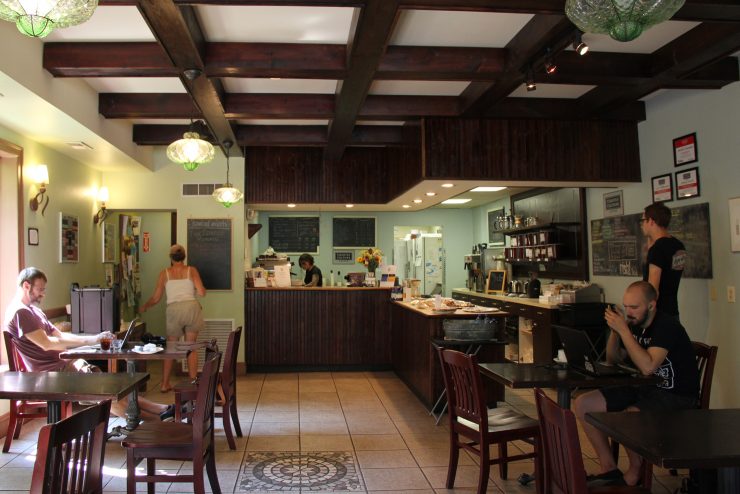
On the menu today: manual brewed coffee to order via Bonmac pour-over, Chemex, or French Press; batch brew coffee on a FETCO, a different featured espresso each week, a “‘spro and tonic” seasonal beverage, and milk beverages made with Brunton Dairy milk (the mere memory of which makes my mouth water). In the past year, Tazza D’Oro has served two microlots from Counter Culture offered exclusively to them. In the works is a new chef, Nate Hunt, formerly of Point Brugge, enlisted to revise the pastry and food menu so that it pairs well with the seasonal coffee offerings. While the menu might never be allowed to rest on its laurels, the feel of the shop is an unchanging calm that has kept the same customers coming for 16 years.
Tazza D’Oro is located at 1125 North Highland Avenue.
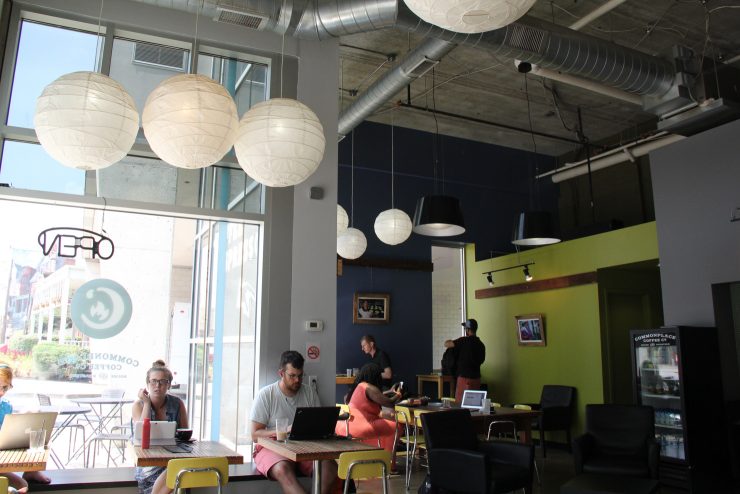
Commonplace Coffeehouse & Roastery
Originally started in Indiana, Pennsylvania (the birthplace of Jimmy Stewart!) by TJ and Julie Fairchild, Commonplace Coffee Roasters had already opened a Pittsburgh cafe in 2010 in the Squirrel Hill neighborhood before it took over already-established coffee shop Voluto in 2012. Commonplace at Voluto, as it’s known, is bright and modern and heralds the (admittedly controversial) revival of the East End and Garfield neighborhoods. The controversy over gentrification doesn’t seem to extend to Commonplace at Voluto, though—students typing on laptops, long-time neighborhood residents, and young homeowners who have recently bought the still low-priced houses in the vicinity all stop by for coffee.
Each Commonplace shop is a little different and the Voluto location focuses on small milk drinks, V60 pour-overs, and Chemex coffee for two. Batch brew coffee on a FETCO is only available until 1 p.m. The few syrups available—vanilla, almond, and chocolate—are made in house. “We get to kind of just keep it a craft menu. We try to do a rotating signature beverage that the baristas are welcome to come up with,” said Drew Von Arx, manager of the Voluto shop. Focusing on the coffee was part of the motivation for Von Arx to take advantage of the burgeoning food truck scene—part of which parks outside.
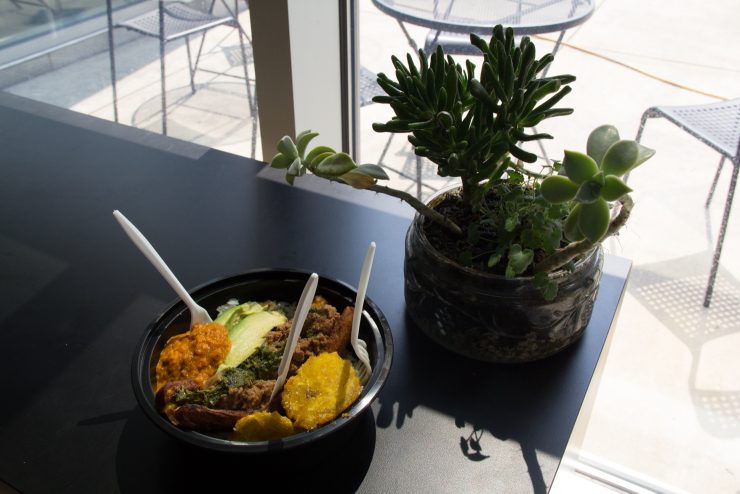
“[There was] a pretty big demand for food. I am not a cook. I don’t understand food. I like to eat it but I don’t understand how it works, and I really don’t like extra stuff,” he says, laughing. By hosting a rotating group of food trucks outside the shop, he provides constantly changing lunch options to coffee customers while enabling his staff and himself to focus solely on coffee. In another community-forward collaboration, Commonplace also shares its new roasting space in Pittsburgh with East End Brewing Company, which uses Commonplace coffee in its Eye Opening Coffee Porter. In addition, Von Arx’s wife, Kellyn Von Arx, makes the shop’s succulent arrangements, and two former cafe employees have started a Commonplace bakery, which provides the cafe with the majority of its pastries.
Ever expanding, now that Commonplace has firmly established itself in the Garfield neighborhood and filled in that gap of Pittsburgh’s coffee grid, it plans to bring specialty coffee to the North Side. The new location, in the heart of the Mexican War Streets, is under construction, taking over a space left vacant from a previous coffee shop and filling the coffee void in a different part of town.
Commonplace Coffeehouse & Roastery has multiple locations, visit their official website for more information.
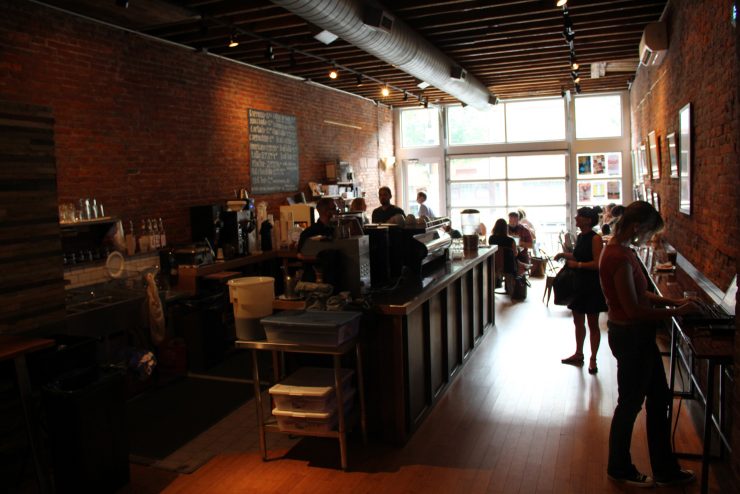
Espresso A Mano
Nestled in Lower Lawrenceville, Espresso a Mano opened its doors in 2009, right before the neighborhood exploded into Pittsburgh’s Williamsburg—though I think the oft-used comparison is a bit of a stretch. That said, it’s easy to imagine the exposed brick walls, garage door front, and custom-built furniture of Espresso a Mano on a Brooklyn street. What’s harder to imagine is a coffee professional walking down a Brooklyn street, seeing an empty storefront, renting it, and turning it into a coffee shop only a few months later with the help of a small business loan.
Enter Matt Gebis. After working at La Prima Espresso Company in Pittsburgh for about five years, Gebis decided he wanted to create a coffee shop of his own. And though the story of his shop isn’t unique, in a time when there is a prevalence of million-dollar cafes that are beautiful testaments to architecture, it’s a reminder of what it takes to create a great cafe one piece at a time. I love expensively built-out cafes—they’re gorgeous!—but I also love the idea of starting small and independent and building as you grow, which is a testament to Pittsburgh’s way of thinking (rather than architecture) as that’s how everyone in this guide started their shop: an idea, a “for rent” sign, some savings, and perhaps a loan.
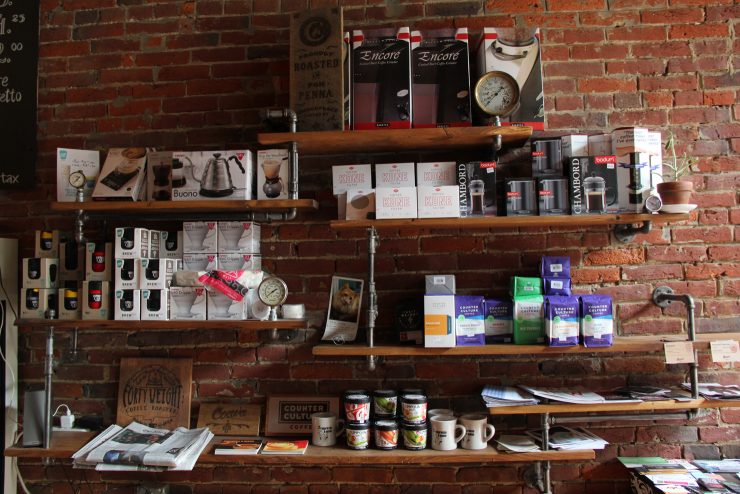
Espresso a Mano and Lawrenceville have grown in tandem, the neighborhood going through a revival while Espresso a Mano collected new regulars and drop-ins. In keeping with that growth and the Pittsburgh do-it-yourself mentality, Gebis and the talented crew at Espresso a Mano will soon undertake roasting, starting small and teaching themselves. Until then, they’ll still be serving primarily Counter Culture and Coava Coffee Roasters, and throwing guest roasters into the mix from time to time—they’ve previously poured Madcap Coffee, Ritual Coffee Roasters, Verve, PT’s Coffee Roasting Company, Commonplace, and Forty Weight Coffee Roasters. As its name implies, the shop focuses on espresso drinks, and the bar offers two espressos to choose from for shots or milk beverages. As the weather turns colder, specialty beverages will start to spice up the menu including a honey cardamom latte and a decadent bicerin.
“I think it’s pretty simple, just present something that’s really delicious to someone, and do it in a manner that’s friendly,” Gebis told me. “If someone wants to continue the discussion of the coffee further, that’s great. Make great coffee and be nice to people. That’s it.”
Espresso a Mano is located at 3623 Butler Street.
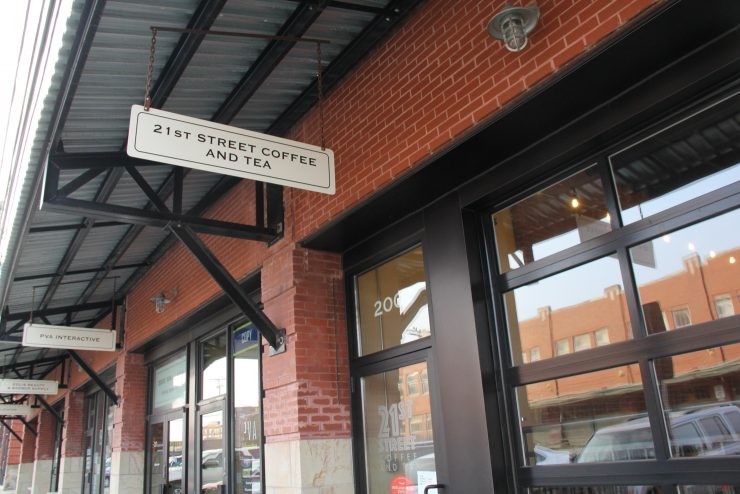
21st Street Coffee and Tea
Amidst Steelers paraphernalia shops, erstwhile-produce-wholesalers-turned-Greek-and-Mexican-markets, and one-time factories developed into lofts, sits 21st Street Coffee and Tea—on Smallman and 20th Streets. A long-running joke between customers and baristas that the name no longer refers to the shop’s location, it’s a joke that co-owner Luke Shaffer doesn’t mind. “Our downtown store is called 21st Street… I’d rather people poke fun at that and know that it’s us than not know it’s us.”
He and his wife, Alexis Shaffer, opened their cafe in Pittsburgh in 2006. Blown away by Intelligentsia Coffee’s quality and passion for coffee, they started out serving Intelligentsia exclusively and have done so ever since. A lot of other things have changed since the early days, though, including the location. “We were in this 200 square foot—maybe—shop,” Luke Shaffer recalls. “No seating… We had blended drinks, whatever you want, all the condiments, just whatever anyone wanted because we hadn’t yet figured out what we wanted—other than to have a nice business.”
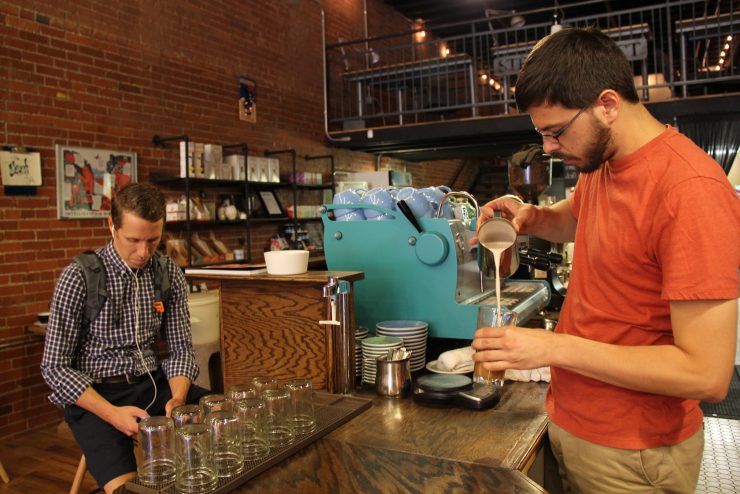
Over time, Luke and Alexis Shaffer honed their coffee skills and developed an appreciation for coffee served simpler. It was at that point that they moved to a nearby larger spot, on the corner of 21st Street. They changed the name to reflect their new business ethos, simply 21st Street Coffee and Tea, and began to put that ethos—clean precision and a honed quality that strives for excellence—into practice in the shop. Their menu showcases exclusively manual-brewed coffee, espresso, nitrogenated cold brew on tap, and milk beverages made with the luscious Brunton Dairy milk.
Now in an even larger location just a few doors down with exposed brick walls, Eames-style furniture, and the same regulars that have been with them for almost ten years, the Shaffers feel like they’ve finally realized the vision they had for their business. “It was a little cloudy—but this was pretty much what we wanted nine or 10 years ago. It just took us a little while to get all the pieces together,” Luke Shaffer said. Alexis Shaffer adds that their vision has always included taking care of their employees—which is evident when I see that nearly everyone working is a former co-worker of mine from my own employment at 21st Street, more than two years ago.
21st Street Coffee and Tea has multiple locations, visit their official website for more information.
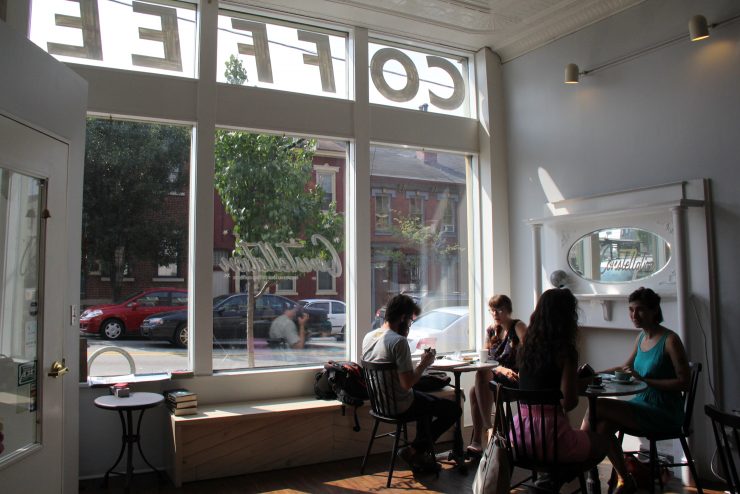
Constellation Coffee
“I was thinking of things that described using a coffee shop to navigate the rest of your day. Sort of like an entry point to other places, other things—a nexus,” said owner Amy Weiland of her inspiration behind the name of her cafe. Constellation Coffee, the newest of this guide’s coffee shops, sits at the Four Corners of Pittsburgh, the boundary of Lawrenceville and Bloomfield, in a small area that is at the same time both neighborhoods and neither neighborhood. Weiland wanted her shop to navigate the in-between-ness.
Weiland has served Ceremony Coffee Roasters coffee since she opened up in 2013. A house-made vanilla syrup and a local maple syrup are the only embellishments to a simple but refined menu that includes cold brew, batch brew, espresso, milk beverages, and a few manual brew methods. Cold-brew coffee can be purchased to go in reusable Ball jars with the shop’s logo engraved on them. Practical and pretty. “I’m minimal all the way. No frills. Just classic stuff. We know what works, we like what we have,” says Weiland.
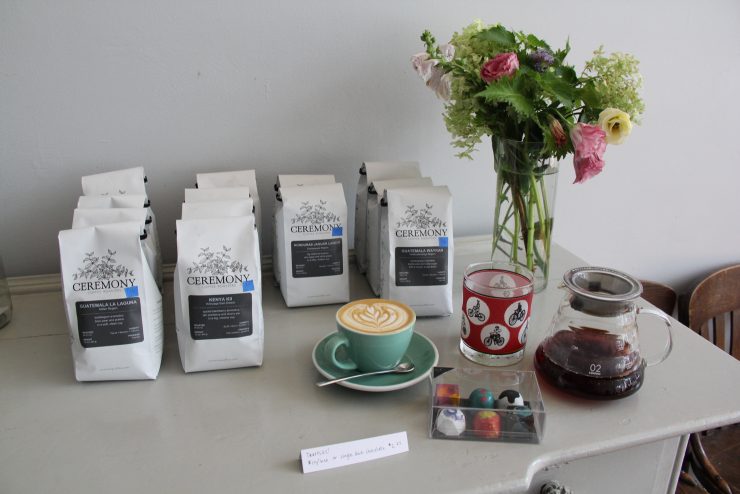
Weiland explains that, as a barista, she didn’t have loads of money when she opened the space, which already had coffee equipment, if not quite of the standard she’d have liked. Six months after she opened, she was able to buy a new espresso machine—a Linea Classic—and has kept improving the shop’s equipment piece by piece. Weiland often worked the bar solo when she first opened up and her personality and precisely-dialed-in coffee soon won her regulars and turned neighborhood residents who would pop in just to say, “we’re glad you’re here” into loyal customers.
What’s next for Weiland and Constellation Coffee? “I’m curious to see, myself!” she said. “Before it was like: I don’t even know what I’m going to do tomorrow! Now it’s like: actually, I think things are going to be OK and I can start thinking about the future… I think, if anything, Pittsburgh really needs good breakfast spots that also have good coffee,” Weiland muses, imagining her own take on a classic diner. As I appreciate the work she’s put into Constellation Coffee to make it the beautiful cafe it is, I can’t help but hope that diner is in the cards.
Constellation Coffee is located at 4059 Penn Avenue.
Rachel Grozanick is a freelance journalist based in Portland, Oregon. Grozanick has contributed previously to Bitch Magazine, 90.5 WESA in Pittsburgh, and 90.7 KBOO in Portland. Read more Rachel Grozanick on Sprudge.
The post The Coffee Lover’s Guide To Pittsburgh appeared first on Sprudge.

